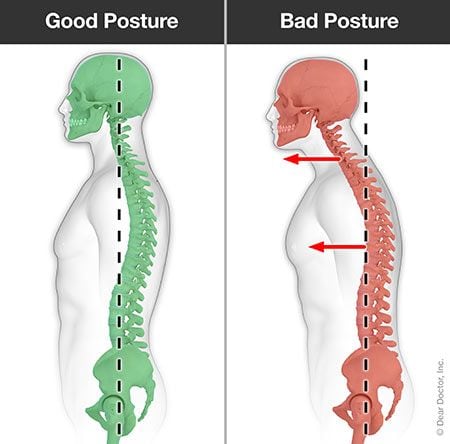Chiropractic care and Posture
Having good posture is more important than you may realize. Posture refers to the position that we hold our bodies in while sitting, standing, and lying down. Good posture is when your body parts are in the correct alignment and supported by the right amount of muscle tension against gravity. When our bodies are properly supported, we can avoid many musculoskeletal disorders. Unfortunately, many people suffer from the negative effects that come with poor posture habits that have been developed over the years.
Holding our bodies in “good” posture puts the least amount of strain on muscles and ligaments while moving and carrying weight—and it offers numerous health benefits. By the same token, poor posture comes with a variety of side effects. Some of the consequences of having “bad” posture include chronic pain, headaches, heartburn, and even incontinence. Some people may also experience poor digestion, constipation, poor balance, difficulty breathing, fatigue, and sleep disturbances. When posture isn’t ideal, the postural muscles (the muscles that work to hold the posture in place) become disengaged and weak, resulting in difficulty maintaining good posture, as well as making areas of the spine more vulnerable to injuries.
Sustaining good posture can benefit our bodies in numerous ways. Good posture requires and helps sustain a certain level of muscle flexibility and strength—it’s a habit worth developing! Good postural habits can minimize excess wear and tear on the joints of the body which can advance the arthritic process and create unwanted joint pain. Improper posture can be problematic not only for the joints of the body; it can also put added strain on the spine. Ideal posture puts the least amount of stress on the ligaments that hold our spinal joints together, lowering the risk of sustaining an injury. When our body is functioning as it should and our muscles are working efficiently, we end up using less energy throughout the day and becoming less tired.
Understanding Chiropractic Posture
Chiropractic care plays a crucial role in addressing posture-related issues and promoting overall spinal health. By correcting misalignments and addressing postural imbalances, chiropractors can help individuals improve their posture and alleviate related symptoms such as back and neck pain. This article explores the relationship between chiropractic care and posture, highlighting the methods and benefits of chiropractic treatment in achieving better posture.
What is Chiropractic Care and its Role in Posture Correction?
How can chiropractic care help improve posture?
Chiropractic care focuses on the diagnosis and treatment of musculoskeletal disorders, with an emphasis on the spine. Chiropractors utilize various techniques and adjustments to correct spinal misalignments and improve overall posture. Through targeted interventions, chiropractic care can help individuals address postural imbalances and achieve a more aligned and healthy posture.
Benefits of chiropractic treatment for posture correction
Chiropractic treatment offers an array of benefits for posture correction. By targeting the root cause of postural issues, chiropractors can provide long-term solutions for improving posture and enhancing spinal health. This can lead to reduced discomfort, improved mobility, and enhanced overall well-being.
Types of postural problems that chiropractic care can address
Chiropractic care can effectively address various postural problems, including forward head posture, kyphosis, scoliosis, and excessive lumbar lordosis. By utilizing targeted techniques, chiropractors can tailor treatment plans to specifically address each individual's unique postural concerns.
How Can a Chiropractor Help with Poor Posture?
Methods used by chiropractors to correct poor posture
Chiropractors employ a range of methods to correct poor posture, including spinal adjustments, targeted exercises, and ergonomic recommendations. These approaches aim to realign the spine, strengthen supporting musculature, and improve postural habits to alleviate poor posture symptoms.
Chiropractic adjustments for improving posture
Chiropractic adjustments, also known as spinal manipulations, are a key component of improving posture. By applying controlled force to specific spinal segments, chiropractors can restore proper alignment and function, leading to improved posture and reduced discomfort.
Ways chiropractors address specific postural problems
Chiropractors address specific postural problems through personalized treatment plans tailored to each individual's unique needs. Whether addressing forward head posture, rounded shoulders, or pelvic misalignment, chiropractors employ targeted interventions to correct postural imbalances and promote proper alignment.
Importance of Posture in Chiropractic Care
Why is good posture important for spinal health?
Good posture is essential for maintaining spinal health as it ensures that the spine is properly aligned, reducing undue stress on the supporting structures. Proper posture also promotes optimal nerve function, enhances circulation, and supports overall musculoskeletal well-being.
Effects of poor posture on spinal alignment
Poor posture can have detrimental effects on spinal alignment, leading to increased strain on the vertebrae, discs, and surrounding soft tissues. This can contribute to a range of spinal issues, including misalignments, decreased range of motion, and discomfort.
How chiropractic care can help in postural correction
Chiropractic care can effectively help correct poor posture by addressing the underlying musculoskeletal imbalances and misalignments. Through targeted adjustments and rehabilitative exercises, chiropractors can facilitate postural correction, promoting spinal alignment and overall health.
Common Postural Problems and Chiropractic Solutions
Dealing with forward head posture through chiropractic care
Forward head posture is a common issue exacerbated by modern lifestyles and prolonged device usage. Chiropractic care can address this problem through specific adjustments and exercises aimed at restoring proper cervical alignment and strengthening supporting musculature.
Chiropractic treatment for back pain related to postural issues
Back pain related to postural issues can be effectively addressed through chiropractic treatment. By addressing spinal misalignments and strengthening the supporting musculature, chiropractors can alleviate discomfort and promote improved posture, thereby reducing the recurrence of postural-related back pain.
Methods to fix bad posture with chiropractic approaches
Chiropractors utilize a range of approaches to fix bad posture, including spinal adjustments, rehabilitative exercises, and lifestyle recommendations. By addressing the underlying causes of poor posture, chiropractic care can effectively facilitate long-term postural improvements.
Improving Posture through Chiropractic Techniques
Chiropractic care methods for correcting spinal misalignment
Correcting spinal misalignment is a key focus of chiropractic care. Through targeted adjustments and rehabilitative strategies, chiropractors can address spinal misalignments, promoting proper alignment and improved posture.
Addressing muscle imbalance for improved posture with chiropractic treatment
Chiropractic treatment addresses muscle imbalance by targeting specific muscle groups through exercises and adjustments. By strengthening weak musculature and relaxing overactive muscles, chiropractors help individuals achieve improved posture and overall musculoskeletal balance.
Chiropractic approach to fix bad posture and its long-term benefits
The chiropractic approach to fixing bad posture focuses on identifying and addressing the underlying causes of poor posture, thereby providing long-term benefits. By promoting spinal alignment, musculoskeletal balance, and postural awareness, chiropractors support individuals in achieving and maintaining healthy posture for improved overall health.
Symptoms and Causes of Poor Posture
There are numerous factors that can contribute to the development of poor posture. Some of the most common are stress, obesity, abnormally tight muscles, high-heeled shoes, and weak postural muscles. Other risk factors include a poor working environment, decreased flexibility, poor posture while working, and unhealthy sitting or standing habits. Common signs of bad posture include hunched or rounded shoulders, a rounded upper back, and a forward resting head. People with poor posture more often than not will experience secondary pain as a result of their poor posture.
Improving Posture
While it’s easy to see how a person can develop poor posture habits over the years, there is hope. Chiropractic care is able to help improve posture over time. The amount of time it takes to correct poor posture depends on how long the habit has been sustained. The longer a person has been sitting, standing, and lying down with poor posture, the more the joints have likely adapted to these positions, so it may take longer to correct.
Another way to help improve posture is by becoming more aware of it while sitting and standing. While standing, it helps to keep the knees slightly bent with relaxed arms and the shoulders pulled back. When lying in bed at night, it’s important to avoid sleeping on the stomach.
Why Seek Chiropractic Care to Improve Posture?
During an office visit, chiropractors conduct a thorough assessment of the joints and spine to identify any restrictions or misalignments that may be having an impact on your current posture. We also check for postural imbalances. Some causes of this include routinely keeping one shoulder sitting higher than the other, the head tilted, or the pelvis tucked or tilted. Spinal adjustments can increase the mobility of the joints of the spine, allowing for easier postural control. Chiropractors will often hear their patients say they “feel taller” or they “can stand up straighter” after an adjustment.
Various research studies have shown that routine chiropractic adjustments help improve posture over time. Maintaining good posture is an important part of maintaining good health. Improving posture is a proactive move toward living a more functional, healthier life. If you are curious about the state of your posture or would like to improve it, chiropractic care can help in a safe, non-invasive way.
More about Wellness Care
- Stress Relief
- Sleep Quality
- Posture
- Introduction to Wellness And Prevention
- Inflammation Management
- Lifestyle
- Children and Chiropractic Care
- Ergonomics
- Exercise and Stretching
- Anxiety and Depression
- Aging and Your Spine
- Family Chiropractic




